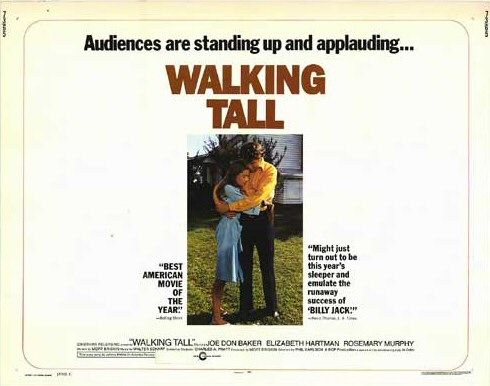 About 50 minutes into the 1973 film Walking Tall (not to be confused with the 2005 version that starred Dwayne Johnson), there’s a scene in which newly elected sheriff Buford Pusser (Joe Don Baker) gives a speech to his deputies. As the deputies stand at attention and as Pusser announces that he’s not going to tolerate any of his men taking bribes from the Dixie Mafia, the observant viewer will notice something out-of-place about the scene.
About 50 minutes into the 1973 film Walking Tall (not to be confused with the 2005 version that starred Dwayne Johnson), there’s a scene in which newly elected sheriff Buford Pusser (Joe Don Baker) gives a speech to his deputies. As the deputies stand at attention and as Pusser announces that he’s not going to tolerate any of his men taking bribes from the Dixie Mafia, the observant viewer will notice something out-of-place about the scene.
Hovering directly above Baker’s head is a big, black, almost phallic boom mic. It stays up there throughout the entire scene, a sudden and unexpected reminder that — though the film opens with a message that we’re about to see the true story of “an American hero” and though it was filmed on location in rural Tennessee — Walking Tall is ultimately a movie.
And yet, somehow, that phallic boom mic feels oddly appropriate. First off, Walking Tall is an almost deliberately messy film. That boom mic tells us that Walking Tall was not a slick studio production. Instead, much like Phil Karlson’s previous The Phenix City Story, it was a low-budget and violent film that was filmed on location in the south, miles away from the corrupting influence of mainstream, yankee-dominated Hollywood. Secondly, the phallic implications of the boom mic erases any doubt that Walking Tall is a film about men doing manly things, like shooting each other and beating people up. Buford does have a wife (Elizabeth Hartman) who begs him to avoid violence and set a good example of his children. However, she eventually gets shot in the back of the head, which frees Buford up to kill.
As I said earlier, Walking Tall opens with a message telling us that we’re about to watch a true story. Buford Pusser is a former football player and professional wrestler who, after retiring, returns to his hometown in Tennessee. He quickly discovers that his town is controlled by criminals and moonshiners. When he goes to a local bar called The Lucky Spot, he is unlucky enough to discover that the bar’s patrons cheat at cards. Buford is nearly beaten to death and dumped on the side of the road. As Buford begs for help, several motorists slow down to stare at him before then driving on.
Obviously, if anyone’s going to change this town, it’s going to have to be Buford Pusser.
Once he recovers from his beating, Buford makes himself a wooden club and then goes back to the Lucky Spot. After beating everyone up with his club, Buford takes back the money that he lost while playing cards and $50.00 to cover his medical bills. When Buford is put on trial for armed robbery, he takes the stand, rips off his shirt, and shows the jury his scars. Buford is acquitted.
Over his wife’s objections, Buford decides to run for sheriff. The old sheriff, not appreciating the competition, attempts to assassinate Buford but, instead, ends up dying himself. Buford is charged with murder. Buford is acquitted. Buford is elected sheriff. Buford sets out to clean up his little section of Tennessee. Violence follows…
On the one hand, it’s easy to be snarky about a film like Walking Tall. This is one of those films that operates on a strictly black-and-white world view. Anyone who supports Buford is good. Anyone who opposes Buford is totally evil. Buford is a redneck saint. It’s a film fueled by testosterone and it’s not at all subtle…
But dangit, I liked Walking Tall. It’s a bit like a right-wing version of Billy Jack, in that it’s so sincere that you can forgive the film’s technical faults and frequent lapses in logic. Walking Tall was filmed on location in Tennessee and director Phil Karlson makes good use of the rural locations. And, most importantly, Joe Don Baker was the perfect actor to play Buford Pusser. As played by Baker, Pusser is something of renaissance redneck. He’s a smart family man who knows how to kick ass and how to make his own weapons. What more could you ask for out of a small town sheriff?
In real life, Buford Pusser died in a mysterious car accident shortly after the release of Walking Tall. Cinematically, the character of Buford Pusser went on to star in two more films.
Pingback: Embracing the Melodrama Part II #51: Walking Tall Part 2 (dir by Earl Bellamy) | Through the Shattered Lens
Pingback: Embracing the Melodrama Part II #56: Walking Tall: Final Chapter (dir by Jack Starrett) | Through the Shattered Lens
Pingback: A Real American Hero (1978, directed by Lou Antonio) | Through the Shattered Lens